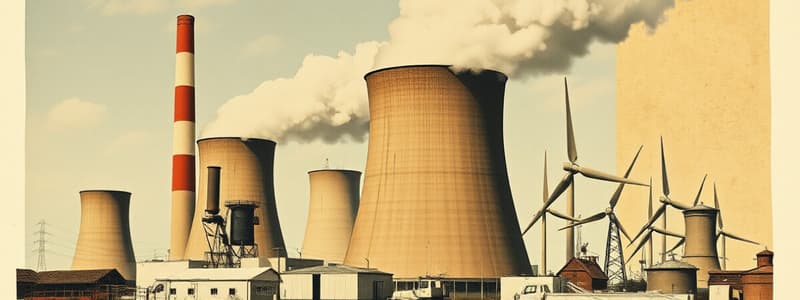Podcast
Questions and Answers
What is a Power Plant?
What is a Power Plant?
A machine or assembly of equipment that generates and delivers a flow of mechanical or electrical energy.
Which of the following are conventional sources of energy? (Select all that apply)
Which of the following are conventional sources of energy? (Select all that apply)
- Nuclear Power Plant (correct)
- Solar Power Plant
- Wind Power Plant
- Diesel Power Plant (correct)
Which of the following are non-conventional sources of energy? (Select all that apply)
Which of the following are non-conventional sources of energy? (Select all that apply)
- Geothermal Power Plant (correct)
- Nuclear Power Plant
- Tidal & Wave Power Plant (correct)
- Gas Turbine Power Plant
Renewable energy sources will get exhausted eventually in the future.
Renewable energy sources will get exhausted eventually in the future.
What is the world’s largest source of emission-free energy?
What is the world’s largest source of emission-free energy?
What are the two processes involved in nuclear energy?
What are the two processes involved in nuclear energy?
The energy associated with the random motion of atoms is called ______.
The energy associated with the random motion of atoms is called ______.
What type of energy exists in a range of wavelengths extending from radio waves to gamma rays?
What type of energy exists in a range of wavelengths extending from radio waves to gamma rays?
What is the definition of a cycle in thermodynamics?
What is the definition of a cycle in thermodynamics?
What is the working substance used in a vapor power cycle?
What is the working substance used in a vapor power cycle?
Flashcards are hidden until you start studying
Study Notes
Learning Objectives
- Define a Power Plant as a facility or machine that generates and delivers mechanical or electrical energy.
- Identify various sources of energy and categorize them as renewable or non-renewable.
- Understand fundamental concepts related to Power Plants.
- Classify types of Power Plants based on the energy sources they utilize and explain their functions.
- Review principles of vapor power cycles including thermodynamic processes.
- Solve related problems concerning vapor power cycles.
Introduction to Power Plants
- Power Plants are essential for electric power generation, crucial for industrial development.
- A country's power generation and consumption directly correlate with its development and standard of living.
- The generator is the primary equipment in a Power Plant, coupled with a prime mover to produce electricity.
Classifications of Power Plants
- Conventional Sources (Non-renewable Energy):
- Steam Power Plant
- Hydroelectric Power Plant
- Diesel Power Plant
- Gas Turbine Power Plant
- Nuclear Power Plant
- Non-Conventional Sources (Renewable Energy):
- Solar Power Plant
- Wind Power Plant
- Tidal and Wave Power Plant
- Ocean Thermal Energy Conversion
- Biomass Power Plant
- Geothermal Power Plant
Sources of Energy
- Renewable Energy:
- Continuously available from natural processes and theoretically inexhaustible.
- Examples include Solar, Wind, Geothermal, Tidal, and Biomass Energy.
- Non-renewable Energy:
- Finite resources expected to be depleted over time.
- Includes solid, liquid, and gaseous fuels, as well as hydraulic energy.
Types of Energy
- Nuclear Energy:
- Generated via fission (splitting of atomic nuclei) and fusion (combining small nuclei).
- Nuclear energy is emission-free and a major energy source.
- Thermal Energy:
- Associated with atomic motion; encompasses both kinetic and potential energy.
- Chemical Energy:
- Released during chemical reactions, primarily through oxidation processes.
- Radiant Energy:
- Exists across a spectrum of wavelengths from radio waves to gamma rays; converted to chemical energy via photosynthesis.
- Mechanical Energy:
- The total of kinetic and potential energy.
- Potential Energy relates to an object's position in a force field, while Kinetic Energy is linked to its motion.
- Electrical Energy:
- Arises from the movement of charged particles, particularly electrons.
Review of Thermodynamics Principles
- Cycle:
- Refers to a series of processes returning to an initial state.
- Vapor Power Cycle:
- Uses steam or water vapor as a working substance; combustion occurs in the boiler, differentiating it from internal combustion engine cycles.
Studying That Suits You
Use AI to generate personalized quizzes and flashcards to suit your learning preferences.




